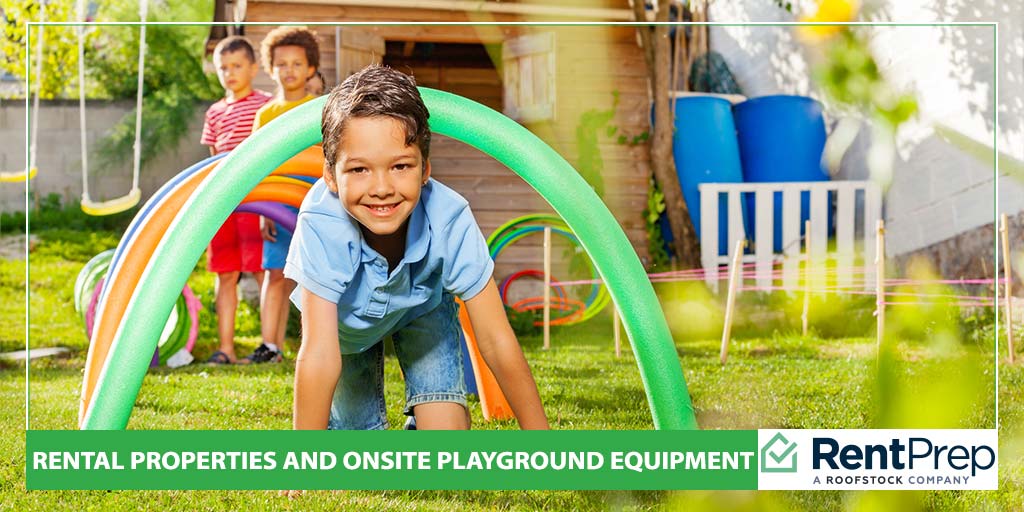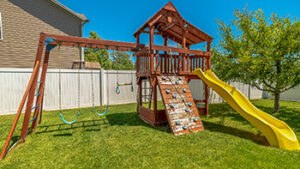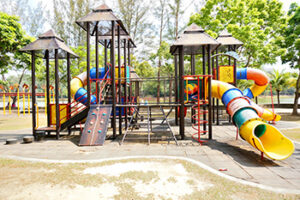
Few things are guaranteed to make people smile like the laughter of little children, but when that laughter comes from enjoying onsite playground equipment, it can make some landlords feel more worry than joy. Children’s playground equipment can be an attractive amenity for a single-family home rental or for a multi-unit complex, but there is a whole other side to think about for landlords.
Playground Equipment and Injuries
With playgrounds, there’s an inherent risk that children will be injured, just as they would with any physical activity. In fact, emergency rooms across the country report that they treat plenty of playground-related accidents. The most common cases include head wounds, dislocated bones, broken bones, cuts, and internal injuries.
Playground equipment is especially conducive to accidents among children because many of the activities take place several feet of the ground, making a fall particularly harmful. Swinging, climbing, sliding, jumping, hanging and more can all put kids off balance, causing them to stumble, trip, and fall. It’s also quite common for children to hurt themselves on other parts of the play equipment like sharp corners and solid platforms. All in all, it’s fair to say that children will most likely experience accidents and injuries while playing on the playground. But is that a landlord’s responsibility or even their fault? It depends.
Accidents vs. Liability

While most people will agree that playground accidents will definitely happen at some point, whether or not a landlord is responsible entirely depends on a number of factors. Most of the time, the landlords who take care of their property, including playground equipment, won’t have anything to worry about. However, there may be situations and conditions where landlords might be found liable for accidents that take place on their property.
The most common triggers for liability lawsuits regarding playground equipment are when the structures are not properly cared for. Over time, the equipment can deteriorate and become less structurally sound. Safety issues that weren’t present at first may present themselves, such as loosening bolts, rusting metal edges and weakening components. Landlords that don’t do regular maintenance and inspections on the equipment can be found liable for any playground injuries. Of course, landlords should take great care to avoid all situations that would lead to a liability lawsuit.
Protecting Against Liability
For most accidents on playground equipment, there’s an understanding about an inherent risk in using the equipment. When kids are sliding, swinging, hanging, jumping and running, there’s always going to be a chance of injury by just participating in that activity. Where landlords can get into trouble is when faulty or damaged equipment itself causes an injury or presents a danger when it doesn’t meet the minimum safety standards.
In order for a landlord to be found liable for an injury on playground equipment, the following conditions would have to exist:
- The landlord failed to maintain the equipment and it deteriorated.
- The injury was a direct result of equipment neglect and disrepair.
- Such an accident was a foreseeable result of equipment neglect.
- Making the repairs to the playground equipment was not overly difficult or costly.
- The landlord was notified of problems and failed to take reasonable action to maintain broken equipment.
If the tenants can show the court that most or all of these conditions existed to lead to the accident, they could win their liability lawsuit. If the landlord can refute each of these conditions with proof, then the court will rule that the incident was an unfortunate accident and not a result of unsafe conditions.
How Landlords Can Properly Set Up Playground Equipment
 Landlords shouldn’t let the fear of liability scare them away from setting up a playground. In fact, if landlords want to add a playground feature to the property, there are several things they can do:
Landlords shouldn’t let the fear of liability scare them away from setting up a playground. In fact, if landlords want to add a playground feature to the property, there are several things they can do:
- Utilize a local construction company to professionally install the equipment.
- Have regular inspections for the equipment, either annually or more often if required by state law and keep copies of the inspection results.
- Make any repairs or replacements immediately upon discovery to avoid causing any accidents and keep copies of the work orders.
- Carry a good landlord insurance policy that will help safeguard against any kind of injuries on the property, including playground accidents.
- Include a playground addendum in the lease agreement that notes the use of such equipment comes at the tenant’s own risk.
- Post a sign at the playground for a multi-use property stating that all tenants can use the area at their own risk.
If landlords follow each of these steps when installing playground equipment on a rental property, there will be fewer problems and much more enjoyment on the part of the tenants. Like any other exterior part of the property, such as the roof, flooring, driveway, or fencing, the playground equipment must be well-cared for and up to standards.
Landlords Must Decide For Each Property
It’s important to remember that landlords cannot unfairly restrict the activities of children or set restrictive rules on just families with children. The Fair Housing Act protects the familial status of families with children, so landlords must set up clear rules around the playground that apply to all tenants, not just those with children.
Of course, whether or not to put in a playground in the first place is completely up to the landlord and should be decided based on the needs of the property and the type of tenants they hope to attract. As long as the landlord does everything they can to keep the playground area safe, there should be no struggles with liability if a child does happen to get hurt. No landlord wants to see anyone injured, especially children, but if done right, the playground equipment can be a fine amenity to any rental property.

